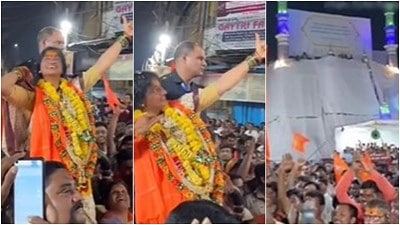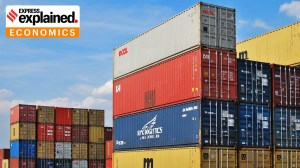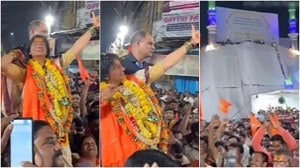- India
- International
Hardeep Singh Puri at Express Adda: Time has come to tweak world order established after World War II
At a recent Express Adda in Delhi, Hardeep Singh Puri, Union Minister of Housing and Urban Affairs and Petroleum and Natural Gas, spoke about a changing world order, India’s dependency on oil, and the need for government intervention in real estate
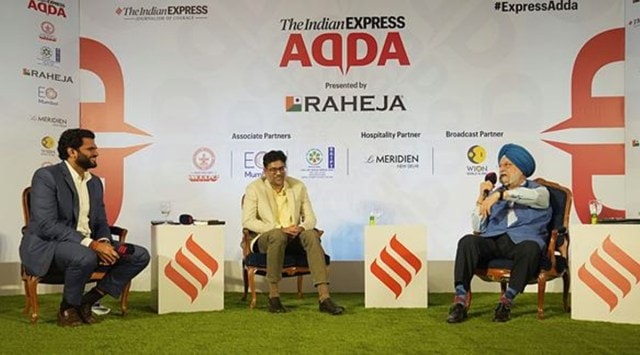 Hardeep Singh Puri Union Minister of Petroleum & Natural Gas and Housing & Urban Affairs, in conversation with Anant Goenka, Executive Director Indian Express Group, and P Vaidyanathan lyer, Executive Editor The Indian Express. (Express photo by Abhinav Saha)
Hardeep Singh Puri Union Minister of Petroleum & Natural Gas and Housing & Urban Affairs, in conversation with Anant Goenka, Executive Director Indian Express Group, and P Vaidyanathan lyer, Executive Editor The Indian Express. (Express photo by Abhinav Saha)At a recent Express Adda in Delhi, Hardeep Singh Puri, Union Minister of Housing and Urban Affairs and Petroleum and Natural Gas, spoke about a changing world order, India’s dependency on oil and the need for government intervention in real estate
On America’s lack of leadership and a changing world order
Another way of addressing this issue is, are we witnessing a process which is already well embarked on deglobalisation? The inflation rate in the US today is the highest in 46 years. The Fed (US Federal Reserve) has announced a steep increase in interest rates. The markets have already factored in that increase in interest rates… and the talk now is that of a similar increase in the coming months. So that is the US.
The most important thing I found there (at Davos) is that Europe seemed to be preoccupied with itself. It took some gentle but assertive interaction to tell them that there is a world outside, which is beginning to face challenges today. We have a number of crises. We should not approach any one crisis in a manner that it ends up exacerbating the other crisis.
The food crisis, the fuel crisis, and the fertiliser crisis. In effect, all three are interlinked. Why is that happening?… The global order, which was established post the Second World War, I think the time has come to see if there is tweaking required in that system to make it fit for the world. The world has changed rapidly.

On how long will India’s dependency on oil continue
I don’t think the problem started on February 24, with the military operations between the Russian Federation and Ukraine. The fuel problem predates that. But February 24 provided it a new dimension altogether. Three things happened as a result of this crisis. While there will be turbulence as we navigate the crisis, some good things will come out of it. One is that people have become extremely cautious because you don’t want the kind of impact on your consuming public, which we’re seeing in some countries around India — you want to make sure you have oil, so you will diversify your sources. Secondly, all this talk about green energy transition will take this much faster. If you look at what we have done in India, we’ve dramatically enhanced our exploration and production. Out of our 3.5 million sq km of sediment basin, we were never exporting more than 6-7 per cent, we ramped it up to 15 per cent. Our biofuel blending in 2014 was 1.4 per cent. Today, we are already blending 10 per cent. We had a target of 20 per cent by 2030. We’ve already brought that forward to 2024-25. E-20 or ethanol 20 per cent blended will be available at our petrol pumps, according to my ministry’s statement, by April 1, 2023. We are going for compressed biogas in a huge way… No matter which way you look at the energy equation, India will be the critical driver of demand in the next 30 years. You have a population which is economically more active. Our per capita consumption is one-third of the global average. Global averages will remain stable…a rich Europe cannot consume more energy, they may have to source it from somewhere else. Earlier, it was that we’ve cut off Russian supply. Now the reality is that Russia may decide to choke off something. I have a feeling that whilstall the positive things are happening, the international arrangements which are in place are going to fundamentally change.
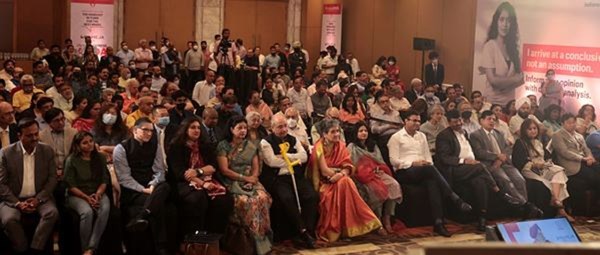 Guest during Hardeep Singh Puri Union Minister of Petroleum & Natural Gas and Housing & Urban Affairs, Govt. of India Express Adda. (Express Photo by Amit Mehra)
Guest during Hardeep Singh Puri Union Minister of Petroleum & Natural Gas and Housing & Urban Affairs, Govt. of India Express Adda. (Express Photo by Amit Mehra)
If insurance covers are not going to be available out of London, then they will become available from other parts of the world. If people think that they can artificially calibrate the amount of supply, well, you might suddenly discover that people have gone right ahead. And you might, when the transition takes place, be left with more than you had bargained for. I have a feeling that whilst all the positive things are happening, the international arrangements, which are in place, are going to fundamentally change.
On the power shift in leadership
Look, it’s very tempting to say that there is a shift in where power resides. I don’t buy that. The US is the lead economy, it’s about $20 trillion. You can’t change that. The Chinese are the second largest economy, around $11-12 trillion. After that, there are one or two countries at five, and there are countries which are today at $3.23 trillion, but very fast coming up to $5 trillion. So what will the world look like in 2030? In 2030, we should be a $10 trillion economy. Now, by that time, presumably the US and China and all the others would also have adjusted but you can look at trajectories, some will go up, some will not be able to go up. The real issue is that will the second-largest economy challenge the world’s largest economy in terms of economic power?
On the change in India’s approach to West Asia
I think these are very strong relationships. Oil may appear to be a more important factor looming on the horizon now, because the oil prices are very high, but please also look at the numbers of the Indian origin or Indian passport holders who are working in these countries. So it’s a very strong relationship and I think the years of the Modi government have witnessed special efforts made by both sides in terms of how the strength of the relationship is fortified by excellent personal chemistry between the heads of state and government.
On why the UN has been unsuccessful in preventing use of force
There are three UNs. One is the member states, which means the 193 member states of the UN. Then there is the UN Secretariat, Secretary General. The third UN, which sometimes I used to think was more powerful than the other two, included NGOs, civil society and you, who mould opinion, you’re the great influencers. If the UN is a mess, don’t blame the UN, blame the member states… Now, in normal times, if the permanent members agree amongst themselves, they can all get together and tell the Secretariat what to do. But if the Russians and Chinese are on the one side, or if the British and French are not seeing eye to eye and each one of them is gung ho and using the veto… just look up the record of the UN, whenever crises have taken place, how many times has the veto been used? And what are the purposes on which the veto has been used?
So today, some countries can turn around and say, which they said in my time also, that if you are facing a situation, which involves one of the mass crimes like genocide, ethnic cleansing, war crimes and crimes against humanity, a permanent member should not use veto. But it’s all talk. Look at what’s happening. I would say that the UN could be more effective.
On renewables and dependency
One of the things that the pandemic did was it made you wary of your supply chains. When the disruption took place, you said, I cannot be dependent in getting my active pharmaceutical ingredients from one source. I need to diversify. We had a vaccine manufacturing capacity in the public sector and I think the previous government, between 2004 and 2014, dismantled it because it was not a priority. Today, I think, the lessons we have learnt have driven home the point — you cannot be dependent on either one source or one type of energy. It can create severe consequences.
On green hydrogen
I think the challenges are there anywhere but the optimism I have on green hydrogen is of a very high order…India is the place for energy and future because the Indian growth story will require energy. The Prime Minister was speaking to the country from the ramparts of the Red Fort on August 15. He said we will do it in mission mode. It is being done.
On banning wheat exports but allowing exports of refined crude
Perhaps private retailers thinking there was more money to be made exporting, decided to reduce the quantum of sales domestically. But I think we’ve dealt with that situation. Am I entitled to ask them to sell? Absolutely. But there comes a tipping point if you have to choose between a little domestic obligation also… and I’ve no doubt they will rise to that. Wheat ban export is a narrative issue. It’s not that we are saying we are going to hang on to the wheat and it’s going to remain here. No. What we’ve done is, in the kind of situation we find ourselves today, it is probably judicious to utilise your ability to export food to certain countries as a strategic means. If you open it up totally, you know what’s going to happen — it will not go to the people who need it. It will go to the people who have the capacity to buy and wheat doesn’t have a limited shelf life, it will be stored in silos, and what can happen is that global prices can shoot up and people will turn around and start selling… it’s possible.
On the need for government intervention in real estate
The government has to make sure it has a system in place which works and the most glaring thing I found when I became housing minister was that we did not have a regulator. So what did we do in RERA (Real Estate (Regulation and Development) Act)? There were attempts to sabotage RERA. A large number of cases were filed against RERA. So the Delhi apex court directed all the cases to be taken up in the Mumbai High Court. The best thing is that the court threw it out, RERA is here and it is a roaring success.
On some states using bulldozers to raze homes
I have an easy way out — as land is a state subject, I have nothing to do with it as a central minister — but I am not going to take that. I’m going to give you a very simple answer… Urbanisation in India is an autonomous and robust process. People come from their villages in large states and come to Tier II or Tier III cities looking for jobs. So a lot of people came into the NCR or Delhi and some unscrupulous elements started cutting… they call it coloniyan kaat rahe hain. With the passage of time, you organise yourself but it’s (still) an unauthorised colony. I piloted the Bill on regularisation of 1,731 colonies. I’ll never forget that day because my daughter was getting married and I had to skip one of the religious ceremonies because I had to go to Parliament. So it’s one of the success stories but it’s still work in progress. In so far as the sensational, “Are you allowed to throw a stone? Are you allowed to damage public property?”— that’s not a discussion that can be easily had without knowing the context. Land is very much a state subject. But no matter what the issue is, the right to dissent is fundamental. But express your dissent in the form of disagreement. Not by saying if you don’t give me this, then I’ll burn this down.
Apr 18: Latest News
- 01
- 02
- 03
- 04
- 05











